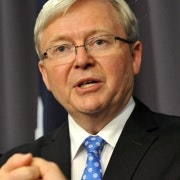Why is Australia so quiet at Doha?
At the end of the first week of the Doha Climate Summit countries are entering into the final stages of negotiations on rules to deal with the 13 billion tonnes of surplus carbon permits left over from the first commitment period of the Kyoto Protocol. With European Union members unable to reach a position on the topic, the spotlight has shifted to Australia as one country that is well placed to help broker a deal.
Widely referred to as ‘hot air', these surplus permits are primarily the result of the economic collapse in former Soviet countries in the early 1990s. The closure of old and inefficient industries in countries such as Russia, Poland and the Ukraine led to a massive drop in carbon emissions, leaving their governments with many more Kyoto carbon permits than needed to meet their targets.
Countries holding this hot air now want to carry it over to the second commitment period of the Kyoto Protocol. At very least this would allow these countries to continue polluting without breaching their Kyoto targets. Worse still, they could be allowed to sell this hot air to other countries, further displacing real efforts to cut carbon pollution.
In Doha countries are considering two proposals to restrict the use of hot air permits in the second commitment period. The proposal put forward by developing countries would prevent countries from trading surplus permits beyond this year, and restrict their use domestically to situations where countries need extra permits to comply with their Kyoto target. This would prevent Eastern European countries from simply relying on hot air to meet their future targets.
In an attempt to find a compromise, Switzerland has also put forward a proposal that would allow a tightly restricted number of hot air permits in the second commitment period, including for trading. The Swiss proposal would also see all hot air permits cancelled at the end of the second commitment period. This is particularly significant for Russia, which will not participate in the second commitment period, but still wants to have access to its surplus permits to help it comply with the new treaty to be agreed in 2015.
Putting aside the technicalities of the two proposals, you would hope that countries would be willing to find a workable solution in the interests of delivering something tangible for the global climate from Doha. Instead the talks have hit a roadblock, with Poland and other Eastern European countries refusing to allow the EU to form a position on this topic.
With the EU effectively sidelined, the spotlight has turned to other developed country members of the Kyoto Protocol, including Australia. To date, however, Australia has been decidedly quiet.
What's stopping Australia from stepping up to the plate?
Australia is sitting on its own surplus from the first commitment period, equivalent to about 80 million tonnes of CO2-e (about 2.7 per cent of our first Kyoto allocation). The government has made it clear that it expects to have access to these permits in the second commitment period.
There have been murmurings in the conference centre that this explains why Australia has been unwilling to play a proactive role in the negotiations to date. However, Australia's surplus is unlikely to be affected by either the Swiss or developing country proposal. This makes Australia the perfect candidate to step forward as an honest broker to strike a deal in the coming days.
In case the government needs any convincing of the importance of this issue, it should refer to the study released by UN Environment Program earlier this month which warned of a widening gap between what is required to keep global warming below two degrees Celsius and the emission cuts countries have said they will make. Surplus permits from the first round of Kyoto were singled out as one of the biggest factors contributing to the emissions gap.
Agreeing on strong rules on hot air permits will mean that Doha will have delivered a significant win for efforts to cut global greenhouse gas emissions. Weak rules will represent a missed opportunity.
Will McGoldrick is Climate Change Policy Manager at WWF-Australia. He is attending the Doha Climate Summit.













